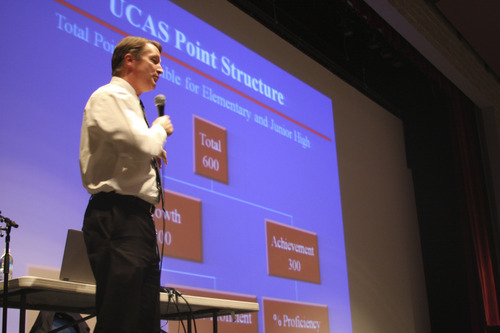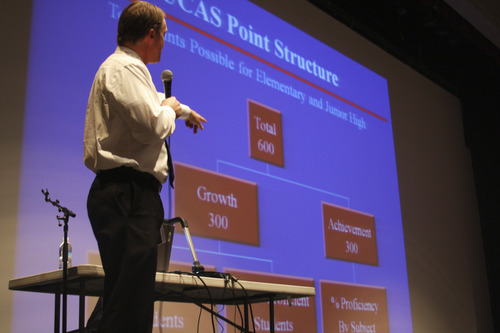This is an archived article that was published on sltrib.com in 2013, and information in the article may be outdated. It is provided only for personal research purposes and may not be reprinted.
With No Child Left Behind left behind, Utah educators are hard at work implementing a new program they've named the Utah Comprehensive Accountability System (UCAS).
On Jan. 17, Granite School District Superintendent Martin Bates spoke to parents and community members at Hunter High School about the new grading system, which focuses on tracking individual student growth. NCLB concentrated exclusively on schoolwide achievement, Bates said, and he emphasized that he was pleased NCLB has been replaced with this system.
Under UCAS, each Utah school will be graded based on a 600-point system — next year they hope to nix the point system and offer a letter grade — based primarily on two categories: growth and achievement. For high schools, a third category called "readiness for graduation" is added. Based on these scores, the schools are divided into three groups: priority, focus and reward schools, priority being the lowest-achieving and reward being the highest. Students also will receive report cards on their individual scores plotted over time. Reports on teachers and specific classes will be required as well.
Currently, two-thirds of the schools in the Granite School District have performed below the state average of 437 out of 600 points. Hunter High scored 362 out of 600, making it a priority school. Bates said this year's calculation is being recalibrated and next year will serve as the true marker of the school's standing. For now, the system is best used as a tool to track individual growth.
"Schools don't take tests. Kids take tests," he said.
In terms of how to raise these scores, Bates said teachers must better follow the state-mandated curriculum, underscoring that it was unfair to students if they were left unprepared for the exam. Simultaneously, he reassured parents that the curriculum was not centered on "teaching to the test."
The NCLB replacement has its limitations. The test fails to account for special-needs students and students' mastery of the English language. Bates said that although the achievement scores of schools with high immigrant populations and special-needs students would be lowered as a result of these factors, their growth rates could well make up for the reduced score in the other category.
Senior Ashley Claypool and junior Octavio Mendozo seemed unfazed by the state's recent educational overhaul. They reported that no real changes had occurred in the classroom. Both reaffirmed the need for standardized testing not to verify teachers' instruction methods, but to gauge when students needed help.
Beverly Wardle, a parent in attendance who has three children at Hunter High School, believes there has to be a better system. Wardle is convinced that standardized testing places unfair pressure upon teachers who are made responsible for their students' achievement. It also puts undue pressure on students to test well.
"Standardized tests fail to account for students having a bad day, individual testing capacity and student motivation," she said.
Marlin Neilson, the father of a junior at Hunter, likes the idea of tracking each student and each school's progress over time, but is concerned about the exam's failure to account for English-language mastery levels of students. He believes standardize testing is a necessary measure to make sure everyone is on track.
Overall, the meeting was informative, but many parents left concerned about the new exam's limitations and their school's performance. Bates said that UCAS would be around "for years to come," so there is time for adjustment and improvement.
How is your school doing?
To see how your school scored, go to http://www.schools.utah.gov and click on the Public School Data Gateway and then "UCAS Report."









